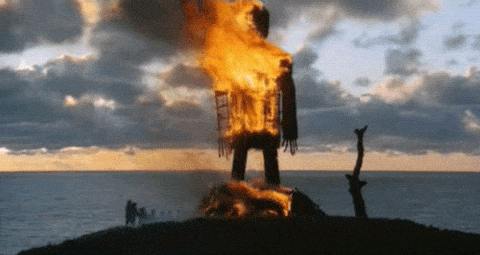The nation of all the Gauls is extremely devoted to superstitious rites; and on that account they who are troubled with unusually severe diseases and they who are engaged in battles and dangers, either sacrifice men as victims, or vow that they will sacrifice them, and employ the Druids as the performers of those sacrifices; because they think that unless the life of a man be offered for the life of a man, the mind of the immortal gods cannot be rendered propitious, and they have sacrifices of that kind ordained for national purposes. Others have figures of vast size, the limbs of which formed of osiers they fill with living men, which being set on fire, the men perish enveloped in the flames. They consider that the oblation of such as have been taken in theft, or in robbery, or any other offence, is more acceptable to the immortal gods; but when a supply of that class is wanting, they have recourse to the oblation of even the innocent.
– Commentaries on the Gallic War
 |
| Aylett Wicker Man, 1676 |
The Wicker Man was a large wicker effigy mentioned by Julius Caesar, in which human sacrifices were offered by the Gauls to the Celtic gods.
 |
| Pennant Wicker Man, 1781 |
Many scholars say that Caesar (and presumably Strabo) was an unreliable source who merely repeated earlier accounts made by Posidonius. Many writers also caution that the Wicker Man was likely a fabrication used to impugn the reputation of the Celts, but I get the feeling that this assertion similarly comes from a single source, since every article making this declaration also repeats the phrase "bizarre and negative information" in regard to Caesar's remarks.
Wicker giants are also associated with later traditions related to Gog Magog, while the bearded mask depicted in some engravings of the effigy is sometimes seen as being the face of a Green Man.
 |
| Unknown origin, 1832 |
Neo-pagans are less skeptical about the Wicker Man, and many groups burn wicker effigies (minus the live humans) during some of their fire festivals. The most important festivals are held at the Spring Equinox, Midsummer, the Autumn Equinox, and the Winter Solstice. Sir James Frazer states that the fire festivals are rites of purification and renewal, while neo-pagans view the purpose of the ritual as a way to create a spirit messenger to commune with supernatural powers (though they do not discount Frazer's definition either).
The Wicker Man entered popular culture due to the 1973 cult film The Wicker Man directed by Robin Hardy. A companion film called The Wicker Tree was released decades later in 2011.
People have drawn parallels between The Wicker Man and the Burning Man event, but Larry Harvey stated that he was was unaware of the film prior to the founding of Burning Man.
There is also a roller coaster at Alton Towers Resort in Staffordshire, England which is said to have been drawn from local legend by the design team, but I have been unable to find any legends related to the Wicker Man originating from the region.
Wicker Men have appeared in a number of fantasy media franchises as sacrificial effigies.
In the Assassin's Creed video game, the human sacrifices are portrayed as [somewhat] voluntary.
A Wicker (or rather, Straw) Man appears during a Halloween event in the World of Warcraft game.
 |
| Crashing the Wickerman Festival |
They also make appearances in the Sláine comic book.
A number of Wicker Men are also portrayed as magically animated constructs as in the Berserk manga.
In the Fate/Grand Order mobile game, the Wicker Man appears as the Noble Phantasm invoked by Cú Chulainn in his Caster incarnation.
The Grand Order Wicker Man is also known as the Cage of Scorching, Consuming Flames, and it scoops up its own human sacrifices to imprison and immolate within its torso.
As far as miniatures of the Wicker Man go, there are a couple of 3D printed versions available which I won't go into, but the field is relatively sparse.
Alan the Wicker Man is made by Ainsty Castings as part of their Trader Town line.
The 10" tall figure comes with two head variants (plain and Iron Maiden versions), and a Green Man mask which fits on the resin head. It also has a compartment in the torso with a separate door that can be used to imprison a 28mm figure.
 |
| Artwork for The Wicker Man 12" picture disk |
Another 10" Wicker Man that I particularly like is made by Wailing Dip, but it is actually a candle made of pure beeswax (No, not the bees!).
 |
| Wailing Dip candle also available on Etsy |
I think the candle really captures the look of the effigy from the film, and I like the idea that you can set it on fire, though I guess that would be the end of your miniature at that point.
The downside of these large figures however, is that they are too big for 1/72 scale.
For various reasons, there is confusion regarding the actual height of the Wicker Man effigies from the movie, with estimates ranging from 22 to 60 feet tall.
I get the impression that the height is under 30 feet tall, which would call for a figure that might be anywhere from 4" to 5" tall.
Wailing Dip makes a Wee Wicker Man candle that falls exactly into this size range, and I am extremely tempted to get it. However, it's not as detailed as the large candle, so I'm really on the fence about it.
 |
| Wailing Dip Wee Wicker Man |
The figure I did end up getting is Nicolas The Strawman, from Crooked Dice Game Design Studio. It is part of the Children of the Fields faction for the 2nd edition of their 7TV game.
The figure comes in three pieces made of a hard resin, and stands 80mm tall. It is not a proper Wicker Man, but I thought it was a well executed sculpt.
Nuada,mighty god of the sun, accept our sacrifice and be appeased.
Avellenau,bountiful goddess of our orchards, accept our sacrifice and make our blossoms fruit.








.jpg)





























